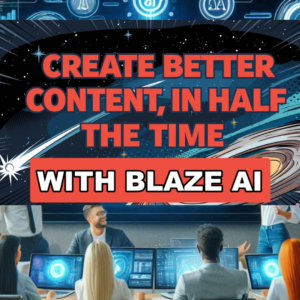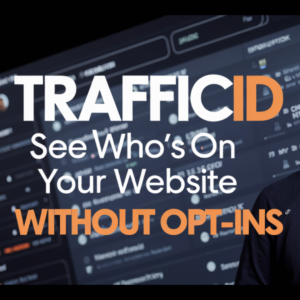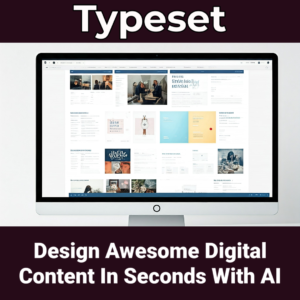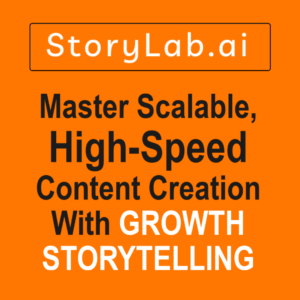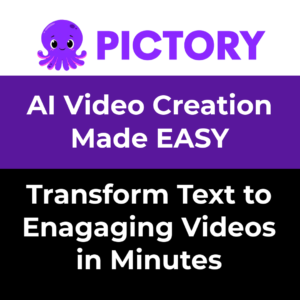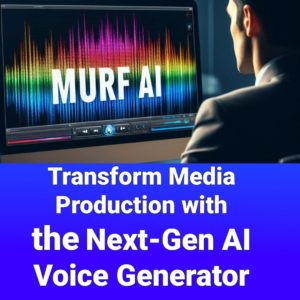Artificial Intelligence (AI) in marketing is no longer a futuristic dream – it’s a powerful reality transforming the industry right before our eyes. Marketers who recognize this shift are uncovering a goldmine of opportunities, while those who ignore it risk being left behind.
The marketing landscape is changing sooner, faster, and more dramatically than many ever expected. Those who step up to the plate early and master AI-driven marketing will absolutely leave the competition in the dust. I promise you that. They’ll be way ahead of the power curve, using AI to make the right moves at the right time to the right audiences, producing game-changing results. As a forward-thinking marketer, your mission is clear: relentlessly gather and leverage the incredible insights AI offers.
From automating mundane tasks to unlocking deep customer behavior patterns, AI is reshaping how we approach every aspect of marketing. This isn’t just another trend – it’s a fundamental shift that’s redefining what’s possible in our field. The essence of AI-powered marketing is becoming something extraordinary to your target segments, using data-driven precision like never before. This article explores the most critical AI marketing trends that are paving the way to unprecedented success in this new, AI-driven world.
Introduction to AI in Marketing
The Evolution of AI in Marketing
AI has come a long way since it started. At first, AI was used for simple tasks, but now it includes many applications that are changing marketing. From machine learning that predicts customer behavior to natural language processing (NLP) that improves customer interactions, AI is changing how marketers work.
Why AI is Essential for Modern Marketing
In today’s digital world, AI is not just a luxury but a necessity. The huge amount of data created every day is overwhelming, and old marketing methods can’t handle this data well. AI helps by sorting through large amounts of information and giving useful insights that can guide marketing strategies. Plus, AI allows marketers to offer personalized experiences on a large scale, which is important for keeping customers happy and engaged.
AI-Powered Content Creation
Automated Content Generation
One of the coolest uses of AI in marketing is automated content creation. AI tools can create high-quality draft content much faster than a human writer. These tools use natural language generation (NLG) to produce articles, blog posts, and even social media updates that are clear and engaging. This saves time and ensures a consistent brand voice across all platforms.
A recent survey by Salesforce showed 76% of marketers are already are using generative AI to create basic concepts while 76% use it to write copy and 71 % tap it to inspire creative thinking, followed by 63% are analyzing market data with it and finally, 62% are employing it to generate image assets. Clearly, of the group surveryed the innovators and early adopters have joined the AI revolution and are making good use of it.
Personalization at Scale
Personalization is key to good marketing, and AI makes it possible to deliver personalized content on a large scale. By looking at user data, AI can figure out what type of content different audience segments like. This lets marketers tailor their messages to individual preferences, increasing the chances of engagement and conversion. For example, AI can recommend products based on past purchases or suggest articles based on reading history, creating a more personalized user experience.
AI in Search Engine Optimization (SEO)
AI and SERP Rankings
Search Engine Optimization (SEO) is a crucial part of digital marketing, and AI is playing a bigger role in this area. AI algorithms can analyze search engine results pages (SERPs) to find patterns and trends, helping marketers optimize their content for better rankings. AI can also predict changes in search algorithms, allowing marketers to stay ahead and keep their visibility in search results.
Voice Search Optimization
With the rise of voice-activated devices like Amazon’s Alexa and Google Home, voice search is becoming more common. AI can help marketers optimize their content for voice search by understanding natural language queries and providing relevant answers. This involves using long-tail keywords and conversational phrases that match how people speak, not just how they type. By optimizing for voice search, businesses can improve their chances of appearing in voice search results, driving more traffic to their websites.
Conversational AI and Chatbots
Enhancing Customer Service
Conversational AI, including chatbots, is changing customer service by providing instant, 24/7 support. These AI-powered assistants can handle many queries, from answering frequently asked questions to processing orders. By automating routine tasks, chatbots free up human agents to focus on more complex issues, improving overall efficiency and customer satisfaction.
Chatbots in E-commerce
In e-commerce, chatbots are becoming essential tools for improving the shopping experience. They can help customers find products, provide personalized recommendations, and even facilitate transactions. For example, a chatbot can guide a customer through the checkout process, ensuring a smooth and seamless experience. This not only improves customer satisfaction but also increases the chances of repeat purchases.
AI in Email Marketing
Automated Email Campaigns
Email marketing is still one of the most effective ways to reach customers, and AI is making it even better. AI tools can automate the entire email marketing process, from creating personalized content to scheduling and sending emails. These tools can also analyze the performance of email campaigns, providing insights into open rates, click-through rates, and conversions. This allows marketers to optimize their strategies and get better results.
Personalization and Segmentation
Personalization is crucial for successful email marketing, and AI makes it easier to deliver personalized content to different audience segments. By analyzing user data, AI can find patterns and preferences, allowing marketers to create targeted email campaigns. For example, AI can segment the audience based on past purchase behavior, sending tailored offers and recommendations to each segment. This increases the relevance of the emails and improves engagement rates.
Predictive Analytics in Marketing
Understanding Consumer Behavior
Predictive analytics is a powerful tool that uses AI to analyze past data and predict future behavior. In marketing, this can be used to understand consumer behavior and anticipate their needs. For example, predictive analytics can identify which customers are likely to leave, allowing marketers to take steps to keep them. It can also predict which products are likely to be popular, helping businesses optimize their inventory and marketing strategies.
Forecasting Trends
Besides understanding consumer behavior, predictive analytics can also forecast market trends. By analyzing data from various sources, AI can identify emerging trends and provide insights into future market conditions. This allows businesses to stay ahead of the competition and make informed decisions. For example, a fashion retailer can use predictive analytics to identify upcoming trends and adjust their product offerings accordingly, ensuring they meet customer demand.
AI in Social Media Marketing
Social Listening Tools
Social media is a treasure trove of data, and AI-powered social listening tools can help marketers tap into this wealth of information. These tools analyze social media conversations to identify trends, sentiments, and influencers. This provides valuable insights into what customers are saying about a brand, allowing marketers to adjust their strategies accordingly. For example, if a social listening tool identifies a negative sentiment around a product, the marketing team can take immediate action to address the issue and improve customer satisfaction.
AI-Driven Social Media Ads
AI is also changing social media advertising by making it more targeted and effective. AI algorithms can analyze user data to identify the most relevant audience for a particular ad. This ensures that the ad reaches the right people, increasing the chances of engagement and conversion. Additionally, AI can optimize ad placements and bidding strategies in real-time, maximizing the return on investment (ROI) for social media campaigns.
Augmented Reality (AR) in Marketing
Enhancing Customer Experience
Augmented Reality (AR) is a new technology that is improving the customer experience in many ways. In marketing, AR can be used to create interactive and immersive experiences that engage customers and drive sales. For example, a furniture retailer can use AR to let customers see how a piece of furniture would look in their home. This not only improves the shopping experience but also reduces the chances of returns.
AR in Retail
In retail, AR is being used to bridge the gap between online and offline shopping. For example, AR-powered apps can provide customers with more information about a product when they scan it with their smartphone. This can include product reviews, price comparisons, and even virtual try-ons. By providing a richer and more informative shopping experience, AR can increase customer satisfaction and drive sales.
AI and Customer Relationship Management (CRM)
AI-Driven CRM Systems
Customer Relationship Management (CRM) systems are essential for managing customer interactions and improving relationships. AI is enhancing CRM systems by providing deeper insights into customer behavior and preferences. AI-powered CRM systems can analyze customer data to find patterns and trends, allowing businesses to tailor their interactions and improve customer satisfaction. For example, an AI-driven CRM system can recommend the best time to contact a customer or suggest personalized offers based on their past behavior.
Improving Customer Retention
Customer retention is a key metric for any business, and AI can help improve it by identifying at-risk customers and taking steps to keep them. By analyzing customer data, AI can identify signs of dissatisfaction or disengagement, such as a decrease in purchase frequency or negative feedback. This allows businesses to address issues before they lead to customer loss, improving customer retention and loyalty.
AI in Advertising
Programmatic Advertising
Programmatic advertising is a type of digital advertising that uses AI to automate the buying and selling of ad space. This allows for more efficient and targeted advertising, as AI algorithms can analyze user data to identify the most relevant audience for a particular ad. Programmatic advertising also enables real-time bidding, ensuring that ads are placed in the most effective locations at the best possible price. This maximizes the ROI for advertising campaigns and improves overall efficiency.
Retargeting Ads
Retargeting is a powerful advertising strategy that involves showing ads to users who have previously interacted with a brand. AI enhances retargeting by analyzing user behavior and identifying the most relevant ads to show to each user. For example, if a user has visited a product page but did not make a purchase, AI can retarget them with ads for that product, increasing the chances of conversion. This ensures that advertising efforts are focused on users who are most likely to convert, improving the effectiveness of retargeting campaigns.
AI and Data Analytics
Big Data and AI
The combination of big data and AI is changing the way businesses analyze and interpret data. AI-powered tools can process large amounts of data in real-time, providing actionable insights that drive marketing strategies. For example, AI can analyze customer data to find trends and patterns, allowing businesses to make data-driven decisions. This not only improves the accuracy of marketing strategies but also enhances overall efficiency.
Real-Time Analytics
Real-time analytics is another area where AI is making a big impact. AI-powered tools can analyze data as it is generated, providing real-time insights that allow businesses to respond quickly to changing market conditions. For example, real-time analytics can identify a sudden spike in demand for a particular product, allowing businesses to adjust their inventory and marketing strategies accordingly. This ensures that businesses can stay agile and responsive in a fast-paced market.
AI in Video Marketing
Automated Video Creation
Video marketing is a powerful tool for engaging customers, and AI is making it easier to create high-quality videos. AI-powered tools can automate the video creation process, from scripting and editing to adding special effects. This not only saves time but also ensures a consistent brand voice across all video content. For example, an AI tool can analyze a script and automatically generate a video with relevant visuals and animations, creating a professional-looking video in a fraction of the time it would take a human editor.
Personalized Video Content
Personalization is key to effective video marketing, and AI makes it possible to deliver personalized video content on a large scale. By analyzing user data, AI can identify the preferences and interests of different audience segments, allowing marketers to create targeted video content. For example, an AI-powered tool can generate personalized video recommendations based on a user’s viewing history, increasing the chances of engagement and conversion.
AI in Influencer Marketing
Identifying the Right Influencers
Influencer marketing is a popular strategy for reaching new audiences, and AI is making it easier to identify the right influencers for a brand. AI-powered tools can analyze social media data to identify influencers who have the most relevant audience for a particular product or service. This ensures that marketing efforts are focused on influencers who can deliver the best results, improving the effectiveness of influencer marketing campaigns.
Measuring ROI
Measuring the ROI of influencer marketing can be challenging, but AI is making it easier to track and analyze the performance of influencer campaigns. AI-powered tools can analyze data from various sources, such as social media platforms and e-commerce sites, to measure the impact of influencer marketing on sales and brand awareness. This provides valuable insights into the effectiveness of influencer campaigns, allowing businesses to optimize their strategies and achieve better results.
AI and Marketing Automation
Streamlining Marketing Processes
Marketing automation is a powerful tool for streamlining marketing processes, and AI is taking it to the next level. AI-powered tools can automate a wide range of marketing tasks, from email campaigns and social media posts to lead generation and customer segmentation. This not only saves time but also ensures a consistent and efficient marketing strategy. For example, an AI-powered tool can automatically segment the audience based on their behavior and preferences, creating targeted marketing campaigns that deliver better results.
Enhancing Productivity
By automating routine tasks, AI is enhancing productivity and allowing marketers to focus on more strategic activities. For example, AI-powered tools can handle data analysis, content creation, and campaign management, freeing up marketers to focus on creative and strategic tasks. This not only improves efficiency but also enhances the overall effectiveness of marketing strategies.
Ethical Considerations in AI Marketing
Data Privacy Concerns
As AI becomes more common in marketing, data privacy concerns are becoming more important. Businesses must ensure that they are collecting and using customer data in a responsible and ethical way. This involves being transparent about data collection practices, getting consent from customers, and implementing strong data security measures. By addressing data privacy concerns, businesses can build trust with their customers and ensure the ethical use of AI in marketing.
Ethical AI Practices
Besides data privacy, businesses must also consider the ethical implications of using AI in marketing. This includes ensuring that AI algorithms are fair and unbiased, and that they do not discriminate against certain groups of people. Businesses must also consider the impact of AI on jobs and take steps to reduce any negative effects. By adopting ethical AI practices, businesses can ensure that they are using AI in a responsible and sustainable way.
Case Studies of AI in Marketing
Mastercard’s Social Listening Tool
Mastercard is a great example of a company that is using AI to improve its marketing strategies. The company uses an AI-powered social listening tool called Digital Engine to analyze billions of online conversations and identify emerging microtrends. This allows Mastercard to stay ahead and adjust its marketing strategies accordingly. As a result, the company has seen a significant increase in click-through rates, engagement, and cost efficiency.
Zara’s AI-Powered Inventory Management
Zara, a leading fashion retailer, is using AI to optimize its inventory management and improve customer satisfaction. The company uses AI-powered tools to analyze sales data and predict which products are likely to be popular. This allows Zara to adjust its inventory and ensure that it has the right products in stock at the right time. By using AI, Zara is able to reduce waste, improve efficiency, and enhance the overall shopping experience for its customers.
The Future of AI in Marketing
Emerging Technologies
The future of AI in marketing is bright, with new technologies set to change the industry even more. For example, advancements in machine learning and natural language processing are making AI more powerful and versatile. This will enable businesses to deliver even more personalized and engaging experiences to their customers. Additionally, technologies like augmented reality and virtual reality are set to become more common, providing new opportunities for immersive and interactive marketing.
Long-Term Implications
The long-term implications of AI in marketing are huge. As AI continues to evolve, it will become an integral part of marketing strategies, driving efficiency, personalization, and innovation. Businesses that embrace AI will be better positioned to stay competitive and meet the changing needs of their customers. However, it is also important for businesses to consider the ethical implications of AI and ensure that they are using it in a responsible and sustainable way.
FAQs
What is AI in marketing?
AI in marketing refers to the use of artificial intelligence technologies to improve marketing strategies and efficiency. This includes applications such as automated content creation, predictive analytics, and personalized marketing.
How does AI improve customer experience?
AI improves customer experience by providing personalized and relevant interactions. For example, AI-powered chatbots can provide instant support, while AI-driven recommendations can suggest products based on a customer’s preferences.
What are the benefits of AI in marketing?
The benefits of AI in marketing include increased efficiency, improved personalization, and deeper insights into customer behavior. AI can automate routine tasks, allowing marketers to focus on more strategic activities, and provide actionable insights that drive marketing strategies.
How can businesses ensure ethical AI practices in marketing?
Businesses can ensure ethical AI practices in marketing by being transparent about data collection practices, getting consent from customers, and implementing strong data security measures. They should also ensure that AI algorithms are fair and unbiased and consider the impact of AI on jobs.
What are some examples of AI in marketing?
Examples of AI in marketing include automated content generation, predictive analytics, and AI-powered chatbots. Companies like Mastercard and Zara are using AI to improve their marketing strategies and customer satisfaction.
What is the future of AI in marketing?
The future of AI in marketing is bright, with new technologies set to change the industry even more. Advancements in machine learning and natural language processing will enable businesses to deliver even more personalized and engaging experiences to their customers.
Conclusion
AI is changing the marketing landscape, offering new opportunities for efficiency, personalization, and innovation. By using AI, businesses can improve their marketing strategies, customer experiences, and growth. However, it is also important for businesses to consider the ethical implications of AI and ensure that they are using it in a responsible and sustainable way. As AI continues to evolve, it will become an integral part of marketing strategies, helping businesses stay competitive and meet the changing needs of their customers.






